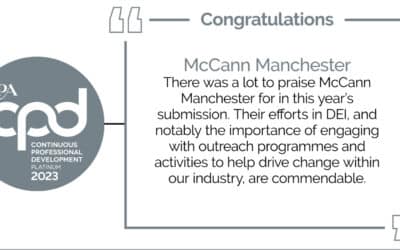The IPA has released new research, endorsed by ISBA, that explores the attributes, influences and workplace values of adland’s growing Gen Z to help improve generational understanding and enable greater partnerships and stronger mutual success between clients and agencies.
The findings will be discussed by IPA President Josh Krichefski, Rock Kitchen Harris’ Nikita Heer and Publicis London’s Prianka Ramlugun at today’s IPA Business Growth Conference.
Gen Z are those born between 1997 and 2012 and while they currently account for approximately 12% of the UK working population, this figure is expected to shoot up to 35% by 2033. As they become a more powerful force in the workplace, this new research ‘Defining the modern workplace’, carried out by Hall & Partners, highlights how Generation Z’s unique perspectives and values are beginning to reshape traditional work environments and shake up established understanding of client-agency relationships. The qualitative study connected with over 30 young agency professionals from creative, media and brand agencies, client leads and recruiters.
A summary of some of the key findings include:
Gen Z attributes:
- Passionate about social justice and activism
- Prioritise mental health and wellbeing
- Crave authenticity and transparency
- Digital natives
- Seek flexibility and balance
- Less tolerant of authoritarian environments
- Embrace change
- Competitive and driven
Gen Z influences:
- COVID-19 – Only the oldest of Gen Z experienced the pre-pandemic work environment. Many entered the workforce amid lockdowns, having no perception of prior work practices previous generations experienced.
- Economic turbulence – Ongoing economic instability triggering a ‘cost-of-living crisis’ in the UK creates a challenging backdrop for Gen Z, making milestones like homeownership and vacations abroad seem out of reach however hard they work.
- Learning from the past – Observing and rejecting the ‘workaholic’ and ‘work hard, play hard’ culture of previous generations, Gen Z values a balanced approach to work.
Gen Z workplace values:
- Work–life rebalance – It’s no longer about living to work or being seen working late to show commitment for Gen Z. The concept of working over and above the hours contracted without a clear rationale is unappealing and no longer guarantees a good return. Instead, Gen Z desire balance and flexibility, in order to keep their mental and physical wellness in check.
- Fostering ambition and rapid progression – Driven and ambitious, Gen Z seeks diverse experiences and rapid feedback alongside skills development, preferring merit-based advancement over tenure.
- Value-driven work – Gen Z want to work within agencies and with clients that correspond to their personal beliefs and values and most importantly, their interests.
- Authentic collaboration – Meaningful collaboration is crucial for Gen Z, with a desire for in-person interactions that foster genuine connections and learning.
- Everyday appreciation – Recognition and appreciation are essential in supporting Gen Z’s focus on wellbeing and development in their role.
The research also explores where misalignment and misunderstanding can occur within the agency-client relationship, especially if these relationships bridge the generational divide, and what can be done to help bridge the gap to enable all sides to flourish.
IPA President Josh Krichefski said: “Times change, working trends change and employees rightly change too. Expecting the same principles to work for generation after generation isn’t sustainable. As IPA President, I have made it my mission to put People First and research like this is vital in improving our understanding of one another and helping to align generational values so that we all win.
“By taking on board the findings from this research, there is real potential for agencies and clients to enjoy a more motivated Gen Z workforce that is less prone to burn-out; recruitment and retention could improve; agencies could experience less churn and clients could reap the benefits by experiencing stronger partnerships with even more engaged, dynamic, consistent and effective agency teams.”












